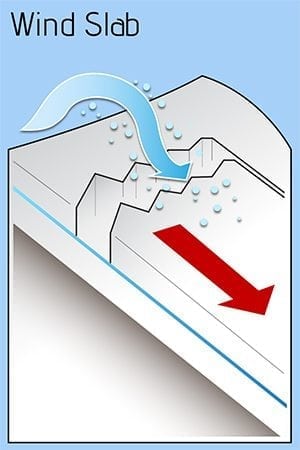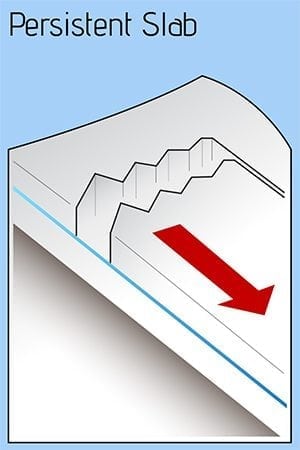Valdez
Above 3,000ftConsiderable
1,500 to 3,000ftConsiderable
Below 1,500ftConsiderable
The Avy Rose shows the forecasted danger by elevation and aspect. It adds more detail about where you are likely to find the dangers mentioned in the forecast. The inner circle shows upper elevations (mountain top), the second circle is middle elevations, and the outer circle represents lower elevations. Think of the Rose as a birds-eye view of a mountain, looking down from above. The rose allows our forecasters to visually show you which parts of the mountain they are most concerned about.
Degrees of Avalanche Danger
Avalanche Problems
Problem 1
Very strong outflow (north) winds have returned to our area. These are forecasted to be much stronger than the wind event directly following the 12/15 storm. The increased strength will also mean a greater area is affected. On 12/22 there were many areas were sheltered powder still existed. These are the areas that will have the highest hazard today as there is a significant amount of snow for transport and wind speeds should be ripe for building dangerous wind slabs (25-35mph) in these areas. In places that were previously damaged by wind, such as locations in close proximity to Thompson Pass summit, winds speeds of 60-70 mph are expected. The avalanche hazard will be less in these areas although remains possible, as there is not as much snow available for transport (already been blown away). In addition, the strength of winds that are expected will be stripping and sublimating transported snow rather than depositing it. Where it does get deposited expect to find wind slab formation further down from ridge lines than you may expect.
Either way wind slabs will be forming today and will be initially reactive to human triggers 1-2 feet in depth.
Asses the hazard of this avalanche problem by paying attention to what slopes are loaded, how deep and their sensitivity. Watch for signs of instability such as shooting cracks and collapsing that would indicate a slope has the potential to produce an avalanche.
Likelihood:
- Almost Certain
- Very Likely
- Likely
- Possible
- Unlikely
Size:
- Historic
- Very Large
- Large
- Small
Trend
- Increasing
- Steady
- Decreasing
Problem 2
Persistent weaknesses in our snowpack will be receiving increased pressure today in specific areas due to wind loaded snow.
Faceted snow near the base of the snowpack has been identified in all three forecast zones. In most locations above brush line, faceted snow is capped by pencil-knife hard wind affected snow. This has created a strong bridging affect making a person or machines weight unlikely to directly affect these layers.
Our area received 3-4 inches of snow water equivalent over a 5 day period beginning 12/11. This put significant stress on these weak layers. Natural avalanches did occur, but activity was not widespread and natural avalanches were mostly confined to the storm snow. This points to the strength of the wind hardened snow overlying the weak facets at the base of our snowpack.
It has been five days since the last significant snowfall event and stability tests that directly target these layers have not produced propagation since. One exception was an interior location just north of our continental forecast zone where propagation in stability tests still existed on 12/18.
Persistent weak layers are tricky to assess and are notorious for surprising people. As long as temperatures remain cold and our snowpack is thin, these weak layers will continue to lose strength. It is likely that facets will reactivate in the future when stress is being applied through dramatic changes in weather such as: significant snow accumulation, rapid warming and wind loading. Maintaining safe travel protocols such as skiing one at a time and avoiding traveling in or above terrain traps will increase your safety margin.
The most likely areas to trigger a persistent slab avalanche would be in steep terrain that was protected from previous strong winds that have occurred this season. This could be below brushline or in areas of terrain that are typically spared from outflows. The Continental zone remains suspect as this area has a weaker snowpack and generally receives less wind, which would decrease the bridging affect mentioned above.
Likelihood:
- Almost Certain
- Very Likely
- Likely
- Possible
- Unlikely
Size:
- Historic
- Very Large
- Large
- Small
Trend
- Increasing
- Steady
- Decreasing
Avalanche Activity
Below is a summary of observed Avalanche activity from the last 7 days. Avalanches that were noted earlier in the season can be viewed by clicking the link below.
If you trigger or observe a natural avalanche consider leaving a public observation.
No recent avalanche activity has been recorded in the last 7 days. Although, it is likely there was some natural activity on the 16th as outflow winds arrived.
Weather
Check out our updated weather tab! A collection of local weather stations are available for viewing with graphs and tabular data included.
NWS Watches and warnings
Northeast Prince William Sound- Including the cities of Valdez and Thompson Pass 415 AM AKST Fri Dec 23 2022 ...BLIZZARD WARNING IN EFFECT UNTIL 8 PM AKST THIS EVENING... ...WIND CHILL ADVISORY REMAINS IN EFFECT UNTIL 1 PM AKST SATURDAY FOR THOMPSON PASS... * WHAT...For the Blizzard Warning, blizzard conditions expected. Winds gusting as high as 65 mph. Visibility reduced to as low as 1/4 mile in blowing snow. There will not be any new snow for this event, just blowing around of existing snow on the ground. For the Wind Chill Advisory, very cold wind chills. Wind chills as low as 50 below zero. * WHERE...For the Blizzard Warning, Thompson Pass and Valdez. For the Wind Chill Advisory, Thompson Pass. * WHEN...For the Blizzard Warning, until 8 PM AKST this evening. For the Wind Chill Advisory, until 1 PM AKST Saturday. * IMPACTS...Widespread blowing snow will significantly reduce visibility. The hazardous conditions could impact travel on area roadways due to the reduced visibility and drifting of snow. The dangerously cold wind chills could cause frostbite on exposed skin in as little as 5 minutes. * ADDITIONAL DETAILS...The strongest winds are expected between early morning and mid afternoon Friday. Winds are then expected to slowly diminish Friday evening through Saturday. Temperatures are expected to drop throughout the day with the coldest wind chill values later this afternoon through Saturday.
NWS Point forecast for Thompson Pass
Date Friday 12/23/22 Saturday 12/24/22 Time (LT) 06 12 18 00 06 12 18 00 06 Cloud Cover CL FW FW OV OV OV OV OV OV Cloud Cover (%) 5 10 25 70 85 95 85 85 75 Temperature -1 -10 -12 -9 -7 -4 2 6 9 Max/Min Temp -1 -12 3 -1 Wind Dir NE NE NE NE NE NE NE NE NE Wind (mph) 33 33 32 29 26 23 17 12 11 Wind Gust (mph) 63 57 55 50 46 42 40 36 29 Precip Prob (%) 0 0 5 20 40 70 40 70 40 Precip Type S S S S S S 12 Hour QPF 0.00 0.02 0.16 0.10 12 Hour Snow 0.0 0.0 2.1 1.2 Snow Level (kft) 0.0 0.0 0.0 0.0 0.0 0.0 0.0 0.0 0.0
Click on link below for Thompson Pass weather history graph:

| Date:
12/23 |
24 hr snow | HN24W* | High temp | Low temp | 72 hour SWE* | December snowfall | Seasonal snowfall | Snowpack Depth |
| Valdez | 0 | 0 | 27 | 6 | .1 | 50 | 85 | 38 |
| Thompson pass | 0 | 0 | 8 | -22 | .12 | 73 | 175 | 32 |
| 46 mile | 0 | 0 | -12 | -22 | N/O | ~22 | ~29** | 27 |
*HN24W- 24 hour Snow water equivalent in inches
*SWE– Snow water equivalent
**46 mile seasonal snowfall total begins December 1st.
Additional Information
Click on the link below for a running summary of this seasons weather history of our area.
Announcements
The avalanche hazard is Considerable at all elevations. Very strong north wind will be building windslabs on lee aspects that were previously protected from the wind. Human triggered avalanches are likely in specific locations 1-2 feet in depth.
Posted by Gareth Brown 12/23 8:00am.
For a description of current avalanche problems, weather information, season history and more click the (+ full forecast) button. Avalanche forecasts will be issued Wednesday-Sunday.

